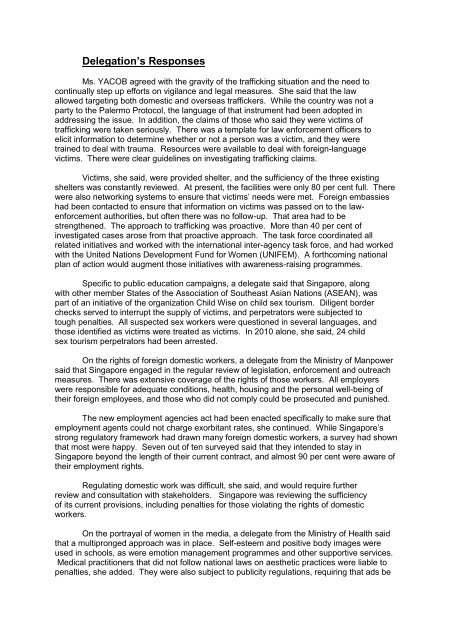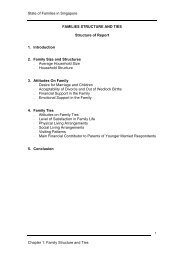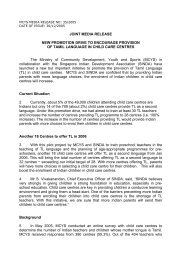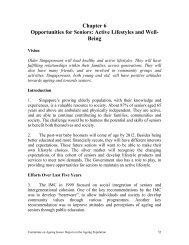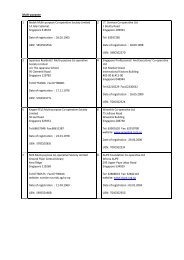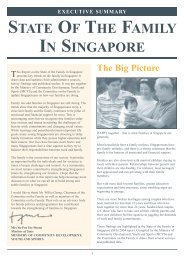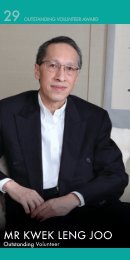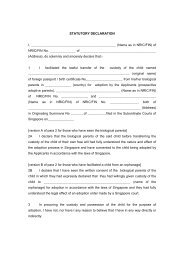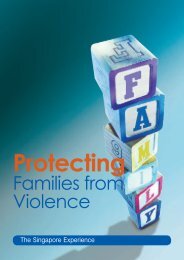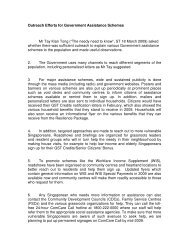General Assembly WOM/1875 - Ministry of Social and Family ...
General Assembly WOM/1875 - Ministry of Social and Family ...
General Assembly WOM/1875 - Ministry of Social and Family ...
You also want an ePaper? Increase the reach of your titles
YUMPU automatically turns print PDFs into web optimized ePapers that Google loves.
Delegation’s ResponsesMs. YACOB agreed with the gravity <strong>of</strong> the trafficking situation <strong>and</strong> the need tocontinually step up efforts on vigilance <strong>and</strong> legal measures. She said that the lawallowed targeting both domestic <strong>and</strong> overseas traffickers. While the country was not aparty to the Palermo Protocol, the language <strong>of</strong> that instrument had been adopted inaddressing the issue. In addition, the claims <strong>of</strong> those who said they were victims <strong>of</strong>trafficking were taken seriously. There was a template for law enforcement <strong>of</strong>ficers toelicit information to determine whether or not a person was a victim, <strong>and</strong> they weretrained to deal with trauma. Resources were available to deal with foreign-languagevictims. There were clear guidelines on investigating trafficking claims.Victims, she said, were provided shelter, <strong>and</strong> the sufficiency <strong>of</strong> the three existingshelters was constantly reviewed. At present, the facilities were only 80 per cent full. Therewere also networking systems to ensure that victims’ needs were met. Foreign embassieshad been contacted to ensure that information on victims was passed on to the lawenforcementauthorities, but <strong>of</strong>ten there was no follow-up. That area had to bestrengthened. The approach to trafficking was proactive. More than 40 per cent <strong>of</strong>investigated cases arose from that proactive approach. The task force coordinated allrelated initiatives <strong>and</strong> worked with the international inter-agency task force, <strong>and</strong> had workedwith the United Nations Development Fund for Women (UNIFEM). A forthcoming nationalplan <strong>of</strong> action would augment those initiatives with awareness-raising programmes.Specific to public education campaigns, a delegate said that Singapore, alongwith other member States <strong>of</strong> the Association <strong>of</strong> Southeast Asian Nations (ASEAN), waspart <strong>of</strong> an initiative <strong>of</strong> the organization Child Wise on child sex tourism. Diligent borderchecks served to interrupt the supply <strong>of</strong> victims, <strong>and</strong> perpetrators were subjected totough penalties. All suspected sex workers were questioned in several languages, <strong>and</strong>those identified as victims were treated as victims. In 2010 alone, she said, 24 childsex tourism perpetrators had been arrested.On the rights <strong>of</strong> foreign domestic workers, a delegate from the <strong>Ministry</strong> <strong>of</strong> Manpowersaid that Singapore engaged in the regular review <strong>of</strong> legislation, enforcement <strong>and</strong> outreachmeasures. There was extensive coverage <strong>of</strong> the rights <strong>of</strong> those workers. All employerswere responsible for adequate conditions, health, housing <strong>and</strong> the personal well-being <strong>of</strong>their foreign employees, <strong>and</strong> those who did not comply could be prosecuted <strong>and</strong> punished.The new employment agencies act had been enacted specifically to make sure thatemployment agents could not charge exorbitant rates, she continued. While Singapore’sstrong regulatory framework had drawn many foreign domestic workers, a survey had shownthat most were happy. Seven out <strong>of</strong> ten surveyed said that they intended to stay inSingapore beyond the length <strong>of</strong> their current contract, <strong>and</strong> almost 90 per cent were aware <strong>of</strong>their employment rights.Regulating domestic work was difficult, she said, <strong>and</strong> would require furtherreview <strong>and</strong> consultation with stakeholders. Singapore was reviewing the sufficiency<strong>of</strong> its current provisions, including penalties for those violating the rights <strong>of</strong> domesticworkers.On the portrayal <strong>of</strong> women in the media, a delegate from the <strong>Ministry</strong> <strong>of</strong> Health saidthat a multipronged approach was in place. Self-esteem <strong>and</strong> positive body images wereused in schools, as were emotion management programmes <strong>and</strong> other supportive services.Medical practitioners that did not follow national laws on aesthetic practices were liable topenalties, she added. They were also subject to publicity regulations, requiring that ads be


